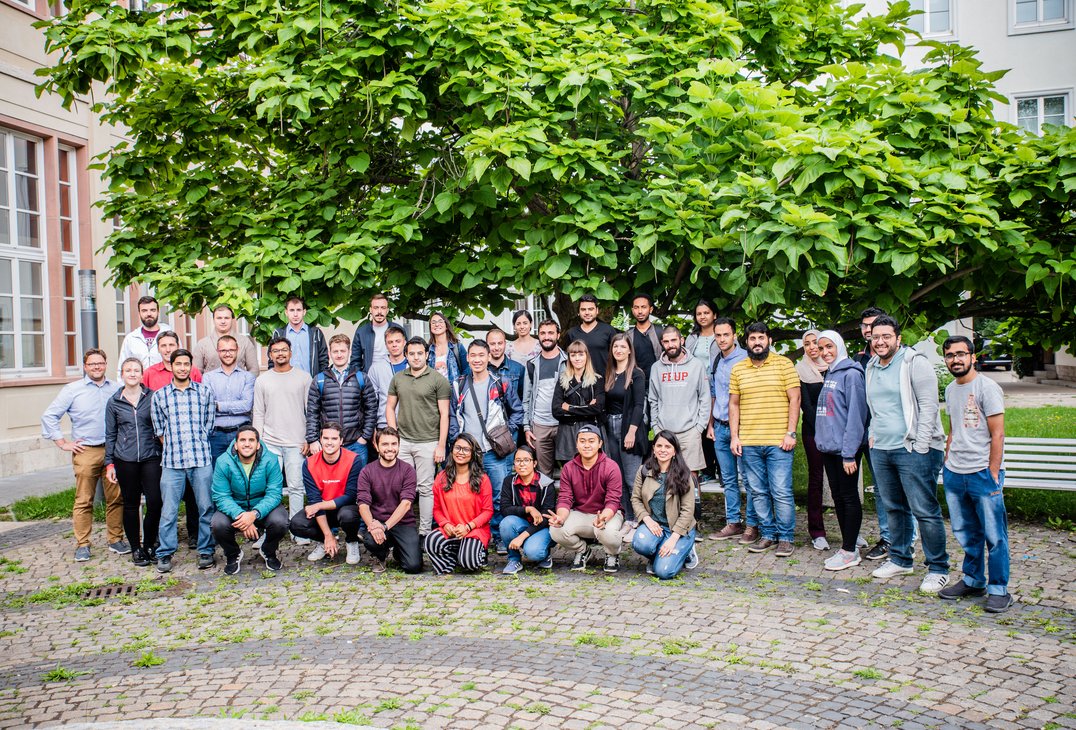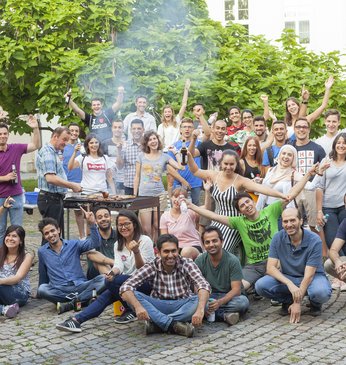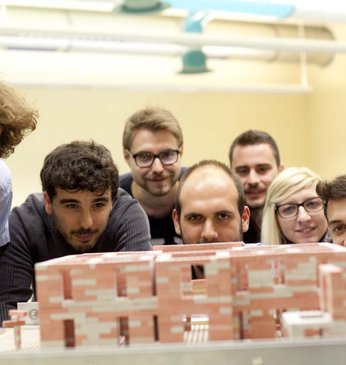Nachwuchswissenschaftler*innen, Bachelorstudierende, Masterstudierende und Doktorand*innen der verschiedenen Fachrichtungen des Bauingenieurwesens oder anderer vergleichbarer Studiengänge.
Voraussetzung für die Teilnahme sind neben ausreichenden Englischkenntnissen die Einreichung eines aussagekräftigen Motivationsschreibens und eines Abstracts (nicht obligatorisch, wird aber sehr begrüßt). über die aktuelle eigene wissenschaftliche Tätigkeit, die das Interesse oder die Fähigkeit zur Weiterentwicklung des Projektthemas vermittelt.
NextGen Engineers – Advanced Training Courses for a Sustainable Tomorrow
NextGen Engineers – Advanced Training Courses for a Sustainable Tomorrow
[Kursbeschreibung nur auf Englisch]
The course content at a glance
In our two-week intensive course, you will embark on a journey to master complex engineering challenges, utilizing modern tools and establishing their scientific relevance within existing interdisciplinary projects with a focus on sustainability, utilizing modern tools and aligning your projects with the Sustainable Development Goals (SDGs). This course offers a deep dive into specialized civil engineering topics, ensuring you develop solutions that are not only innovative but also sustainable.
Investigating current developments towards visualization, modelling, reaction estimation, analysis, simulation methods for sustainable development goals
This year, our course will immerse you in cutting-edge topics within civil engineering, you will explore latest advancements in the use of polymer-modified concretes, as well as simulation, advanced modeling and optimization design for reliability and efficiency in civil engineering structures, assessing their robustness in relation to increased abstraction and reduced dimensionality. Additionally, you will explore insights into the challenges and solutions related to wind forces on buildings and structures, an essential consideration for sustainable and resilient design. You will tackle the complexities of historical and existing masonry structures, applying advanced modeling techniques to assess and enhance their durability and safety under various load conditions, including seismic events. You will be trained in the use of state-of-the-art design, analysis, and simulation methods emphasizes the integration of sustainable practices in preserving and retrofitting existing structures, aligning with the goals of sustainable development by minimizing resource use and extending the utility of built assets.
This year, our course takes a significant stride forward by integrating the Sustainable Development Goals (SDGs) into our curriculum. Understanding the crucial role engineers play in building sustainable futures, we weave the principles of sustainability across our course modules. Through this integration, you will learn not only to approach engineering challenges with advanced technical skills but also with a keen eye for their environmental impact, social equity, and economic viability.
International expertise & on-site visits
Our course provides you with insights into current research projects and international development trends, going beyond technical skills, fostering a multidisciplinary approach, and encouraging you to think critically about the role of engineering in solving global challenges. You'll have the opportunity to learn from international experts, participate in on-site visits with excursions to building sites and/or leading companies, and engage in group projects that simulate real-world engineering tasks.
The current state of the art in the above-mentioned topics will be presented in the lectures and supplemented by individual guest lectures of international experts. Special topics on the individual subject areas will be developed together with the participants within the framework of the group project. Moreover, complex and technically challenging engineering questions will be answered through interdisciplinary cooperation among the participating members.
Do you have desire to...
- connect with like-minded individuals and make friendships,
- learn something new,
- immerse yourself in international atmosphere and German culture/tradition
- make a difference?
... then apply NOW and take the first step towards becoming a leader in sustainable engineering.
Projects 2024
Target group: Bachelor & newcomer within the offered topic
- Project 1: Experience Optimization Vividly with Self-built Robots | Prof. Tom Lahmer (Chair of Optimization and Stochastics) & Jun.-Prof. Lars Abrahamczyk, Melad Haweyou (Chair of Advanced Structures)
- Project 2: Use of Polymer-Modified Concretes (PCC) for Innovative Refurbishment Solutions | Dr.-Ing. Alexander Flohr (Chair of Construction Chemistry and Polymer Materials) & Jun.-Prof. Luise Göbel (Chair of Mechanics of Engineering)
Target group: M.Sc. and early PhD
- Project 3: Structural Wind Engineering | Jun.-Prof. Anastasia Athanasiou (Chair of Natural Hazards and Structural Resilience) & Prof. Guido Morgenthal (Chair of Modelling and Simulation of Structures)
- Project 4: Practical Applications of Autoclaved Aerated Concrete (AAC) in Sustainable Construction | Dr.-Ing. Ehsan Harirchian, Prof. Tom Lahmer (Chair of Optimization and Stochastics)
- Project 5: Nonlinear Modelling and Analysis of Unreinforced Masonry Structures | Lars Abrahamczyk, Aanis Uzair (Chair of Advanced Structures)
Jun.-Prof. Lars Abrahamczyk (Chair of Advanced Structures)
- seit 2010 als Koordinator und Projektleiter des Fachkurses der Fakultät für Bauingenieurwesen an der Bauhaus Summer School
Dozierende, beteiligte Fachbereiche und Partner:
- Prof. Tom Lahmer (Chair of Optimization and Stochastics)
- M.Sc. Melad Haweyou (Research Asisstant at Chair of Advanced Structures)
- Dr.-Ing. Alexander Flohr (Chair of Construction Chemistry and Polymer Materials
-
Jun.-Prof. Luise Göbel (Chair of Mechanics of Engineering)
-
Jun.-Prof. Anastasia Athanasiou (Chair of Natural Hazards and Structural Resilience)
-
Prof. Guido Morgenthal (Chair of Modelling and Simulation of Structures)
-
Dr.-Ing. Ehsan Harirchian (Chair of Optimization and Stochastics)
-
M.Sc. Aanis Uzair (Research Asisstant at Chair of Advanced Structures)
Die Kursgebühr beträgt 890 EURO.
690 EURO für Studierende & Alumni
350 EURO für BUW-Studierende
Die Kursgebühr enthält:
- Orientierung & Betreuung
- Kurs laut Beschreibung
- (Lehr-)Materialien
- Teilnehmerausweis
- Mittagessen in der Universitätsmensa (Montag - Freitag)
- Zertifikat
- Internetzugang an der Bauhaus-Universität Weimar
- Bibliotheksnutzung
- Rahmenprogramm inklusive Exkursionen
- freier Eintritt in Museen der Klassik Stiftung Weimar
Bitte beachten Sie unsere AGB (Zulassungsbedingungen, Stornierungsbedingungen usw.)
Die Kursgebühr enthält nicht:
- Reisekosten
- Unterkunft
- Versicherung
„Blended Intensive Programmes“ ist eine neue Förderlinie der ERASMUS Programmgeneration (2021-2027). Durch diese soll die Nutzung innovativer Lern- und Lehrmethoden gefördert und die Möglichkeiten der Online-Kooperation genutzt werden.
Sofern Ihre Universität eine Partneruniversität der Bauhaus-Universität Weimar im Erasmus-Netzwerk ist, können die Reise- und Aufenthaltskosten (Pauschale) der Teilnehmenden für diesen Summer School Kurs nach der Kurszulassung vom International Office der Heimathochschule übernommen werden. Die Kurskosten, außer Rahmenprogramm und Verpflegung (75 €), werden von der Bauhaus-Universität Weimar getragen.
Bitte kontaktieren Sie uns für weitere Informationen.
Mit dem Absolvieren eines Intensivkurses erhalten Sie ein Teilnahmezertifikat, ausgestellt von der Bauhaus Summer School.
Für den zweiwöchigen Kurs werden 3 Credit Points (ECTS) vergeben. Um 3 ECTS zu erhalten sind mindestens 80% Anwesenheit und das Erfüllen der gestellten Aufgaben erforderlich.
Klären Sie bitte unbedingt vor Ihrer Teilnahme, ob die Leistung von Ihrer Heimatuniversität anerkannt wird.
Falls Sie eine Benotung wünschen, müssen Sie dies unbedingt zu Kursbeginn mit der Lehrperson absprechen! Zusätzliche Leistungen können hierfür nötig sein.
Präsenzkurs
In Weimar
17.08.-31.08.24
ERASMUS BIP
Dieser Kurs wird als Erasmus Blended Intensive Programm durchgeführt.
Time Table
Werfen Sie einen Blick auf das Kursprogramm
Sprache
Die Kurssprache ist Englisch.
Ein Blick in den Kurs


